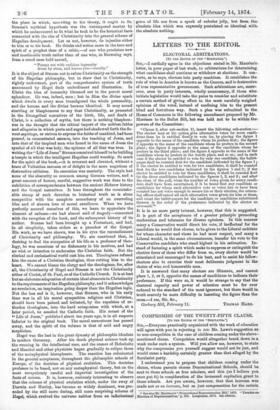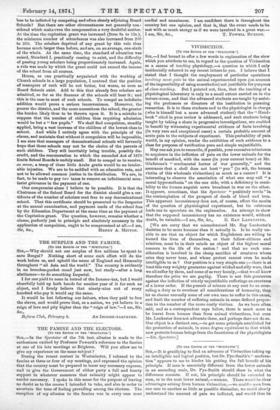COMPROMISE OF THE TWENTY-FIFTH CLAUSE. [TO THE EDITOR OF THE
" SPECTATOR.") Sin,—Everyone practically acquainted with the work of education will agree with you in rejecting in toto Mr. Lowe's suggestion as to non-compulsion in the case of children coming under the above- mentioned clause. Compulsion would altogether breakdown in a week under such a system. Will you allow me, however, to state- why the compromise you yourself suggest would not be just, and would cause a hardship certainly greater than that alleged by the Secularist party.
I understand you to propose that children coming under the clause, whose parents choose Denominational Schools, should be sent to those schools as free scholars, and this (as I believe you once put it) in consideration of the increased capitation grant to those schools. Are you aware, however, that that increase was made not as an increase, but as just compensation for the certain * See also Mr. Morrison's" Proportional Representation Bill," 1872. "Treatise 01) Election of Representatives," p. 193. Longman, 1873. 4th edition.
loss to be inflicted by competing and often closely adjoining Board Schools? But there are other circumstances not generally con- siiiered which make even the compensation a very doubtful matter. At the timethe capitation grant was increased (from 8s. to 12s.), the minimum number of attendances was also increased from 200 to 250. The scholars deprived of any grant by this rule thus became much larger than before, and are, on an average, one-sixth of the whole. At the same time, the standard of education was raised, Standard I. practically ceasing to exist, and the difficulty of passing young scholars being proportionately increased. Again, a rule was made by which the grant could not exceed the income -of the school from all sources.
Hence, as one practically acquainted with the working of Church schools in a large population, I contend that the position of managers of such will be not better, but worse, so soon as Board Schools exist. Add to this that already free scholars are admitted, so far as the finances of the schools will bear it; and this is the can in most of such schools. To compel an indefinite addition would prove a serious inconvenience. Moreover, the poorer the district, and the more necessitous the school, the greater the burden likely thus to be thrown upon it. It is a mistake to suppose that the number of children thus requiring admission would be but a "few pupils." We shall find compulsion, steadily applied, bring a vast increase of the children of the lowest class to eehool. And while I entirely agree with the principle of the .clause, and maintain that without it compulsion will be impossible, I am sure that managers of denominational schools will fervently hope that those schools may not be the choice of the parents of such children. They will inevitably bring trouble, possibly die- -credit, and the remuneration to which the amended Act of 1870 limits School Boards is unduly small. But to compel us to receive, en masse, a troop of these little Arabs gratis would be an intoler- able injustice. We are to be saddled with an education rate, and not to be allowed common justice in its distribution. We are, in 'fact, to be made to pay two taxes to remove an infinitesmial secu- larist grievance in the payment of one.
One compromise alone I believe to be possible. It is that the Chairman of the School Board for the district should give a cer- tificate of the number of scholars sent free to any denominational school. That this certificate should be presented to the Inspector at the annual examination, and payment made of the school fees by the Education Department at the same time as the payment of the Capitation grant. The question, however, remains whether a -clause, perfectly just in principle and absolutely necessary in the application of compulsion, ought to be compromised at all.—I am,



































 Previous page
Previous page